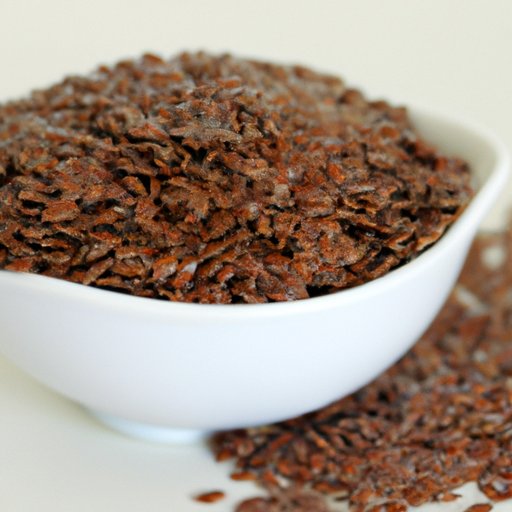
Introduction
Flax seeds, or linseeds, are tiny, nutrition-packed seeds that have emerged as a popular superfood in recent years. But beyond their impressive nutritional profile, flax seeds have gained a reputation as a natural remedy for constipation and other digestive issues. In this article, we’ll take a closer look at the relationship between flax seeds and bowel movements, exploring the science behind the fiber-rich seeds and their potential impact on digestive health.
The Fiber-Fueling Factor: How Flax Seeds Promote Regularity and Gut Health
Flax seeds are rich in dietary fiber, including both soluble and insoluble fibers. Soluble fiber dissolves in water to form a gel-like substance that helps slow down digestion and promote satiety, while insoluble fiber adds bulk to stool and helps move it through the digestive tract. Together, these fibers work in tandem to support digestive health and promote regular bowel movements.
What’s more, research has shown that the fiber in flax seeds can provide numerous other benefits for gut health, such as reducing inflammation, promoting the growth of beneficial gut bacteria, and improving overall gut motility.
Here’s Why You Should Start Adding Flax Seeds to Your Diet to Relieve Constipation
Constipation is a common digestive issue characterized by infrequent bowel movements, strained or difficult bowel movements, and hard, dry stool. While there are many potential causes of constipation, from dehydration and stress to certain medications, fiber deficiency is a common culprit. Fortunately, flax seeds can help provide the fiber boost needed to alleviate constipation.
A study published in the Journal of Ethnopharmacology, for example, found that adding flax seeds to the diet of people with chronic constipation helped to significantly increase bowel movements and reduce constipation symptoms. Similarly, a review of six randomized controlled trials found that supplementing with flaxseed significantly improved bowel movement frequency and stool consistency in people with constipation.
If you’re looking to add flax seeds to your diet for constipation relief, start slowly to give your digestive system time to adjust, and be sure to drink plenty of water with your seeds to ensure optimal hydration.
From Bloating to Easing Constipation: The Benefits of Flax Seeds
Beyond just relieving constipation, flax seeds offer a wealth of other benefits for digestive health. For example, the fiber in flax seeds can help reduce bloating and promote feelings of fullness, making it a helpful addition for weight management.
Additionally, flax seeds have been linked to a reduced risk of certain digestive disorders, such as diverticulitis and colon cancer. Studies have shown that the lignans in flax seeds can help reduce inflammation and oxidative stress in the colon, potentially lowering the risk of colon cancer.
Flax Seeds and Poop: Unpacking Their Relationship
While flax seeds have gained a reputation for their beneficial impact on bowel movements, many people may have questions or concerns about how these seeds actually work to promote regularity. One common concern is that flax seeds may cause diarrhea or loose stools if consumed in excess. However, research has shown that this is generally not the case, as the fiber in flax seeds tends to add bulk to stool rather than causing loose bowels.
That being said, it’s still important to consume flax seeds in moderation and gradually increase intake to give your digestive system time to adjust. Likewise, it’s important to stay adequately hydrated when consuming flax seeds, as fiber needs water to be properly metabolized and move through the digestive tract.
The Role Flax Seeds Play in Regulating Bowel Movements, and How to Incorporate Them Into Your Diet
Now that we’ve explored the science behind flax seeds and digestive health, let’s take a look at how to incorporate these tiny seeds into your daily diet to reap the benefits.
One easy way to add flax seeds to your diet is to sprinkle them over your breakfast yogurt or smoothie, or add them to your favorite baked goods like muffins or bread. You can also mix flax seeds into your oatmeal or granola for a fiber boost.
Another option is to make a delicious flaxseed cracker or meal out of them. A good example is pancakes made with flax meal.
Flush Out Your System with Flax Seeds: A Guide to the Role of Flaxseed in Digestive Health
Overall, flax seeds offer numerous benefits for digestive health and well-being. From relieving constipation to reducing inflammation, promoting beneficial gut bacteria, and supporting colon health, flax seeds are a true superfood for the gut. If you’re looking to support your digestive health, why not give flax seeds a try? Incorporating these tiny seeds into your daily diet can help fuel your digestive system and keep things moving smoothly.
Conclusion
With their impressive nutritional profile and numerous potential health benefits, flax seeds are definitely worthy of consideration as a dietary staple. Whether you’re dealing with constipation, looking to manage your weight, or simply interested in promoting optimal digestive health, flax seeds offer a simple and effective way to fuel your gut and keep things moving.





